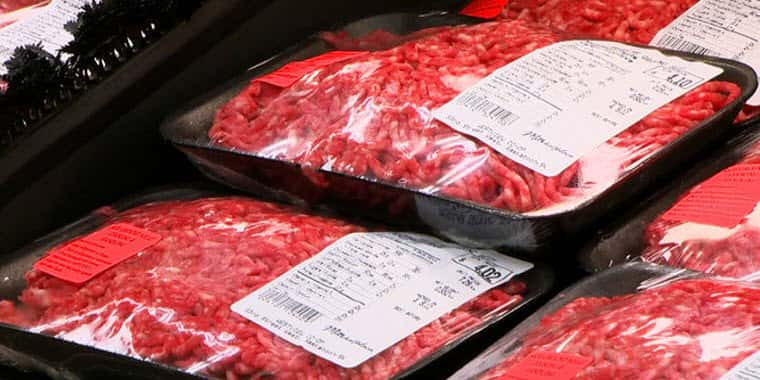by Jerry Hagstrom DTN Political Correspondent
WASHINGTON (DTN) — The House Agriculture Committee voted 38-6 Wednesday to repeal country-of-origin labeling for some meats.
The bill, H.R. 2393, is written in reaction to a ruling by the World Trade Organization that the U.S. country-of-origin labeling program for beef and pork violated U.S. trade obligations because it discriminated against Canadian and Mexican producers. Canada and Mexico have threatened to retaliate against U.S. products if the program continues.
The country-of-origin labeling program has often been described as covering red meat, but the bill would repeal not only the beef and pork labeling but also repeal country-of-origin labeling for chicken, which was not part of the WTO case.
The bill would continue to require country-of-origin labeling for muscle cuts of lamb and venison and ground versions of those meats. Goat meat would also continue to be labeled. Venison was added in the 2014 farm bill.
With Congress preparing for its Memorial Day break, the legislation would not move to the House floor until at least June.
The country-of-origin labeling program has been the subject of legislation since 2002, and at some point, the chicken industry asked to be included, citing fears of imports. Sources said the chicken industry asked to be taken out of the program, but the reasons are unclear.
The decision to label lamb and venison without violating WTO rules point to the real issue behind the WTO case. The problem with labeling beef and pork is that some cattle and pigs are raised in Canada and slaughtered in the United States. Since country-of-origin labeling has been required, U.S. slaughterhouses have segregated Canadian and U.S. animals or in some cases refused to accept those from Canada.
As the WTO said, the “COOL measure has a detrimental impact on imported livestock because its recordkeeping and verification requirements create an incentive for processors to use exclusively domestic livestock, and a disincentive against using like imported livestock.”
The bill already has 68 cosponsors, and at a news conference on the House Triangle Tuesday, House Agriculture Committee Chairman Michael Conaway, R-Texas, a longtime advocate of repeal, said he expects it to pass the committee and come up on the House floor in June.
Passing a repeal bill in the Senate would be difficult, but when asked if the advocates had a backup plan if the Senate doesn't pass it, Conaway said, “full repeal is the solution.”
House Agriculture Committee ranking member Collin Peterson, D-Minn., opposes it. In his comments Wednesday, Peterson called the bill premature and noted more than 60 other countries have labels identifying the origins of meat. Peterson noted the European Union has just implemented country-of-origin meat labels.
“There are obviously distinctions between the EU requirement and what we've tried to do but I think it's worth looking at to see if we can find a workable North American solution,” Peterson said.
Rep. Jim Costa, D-Calif., Conaway's cosponsor, added quickly, however, that “obviously we want to work with our colleagues in the Senate and the administration.”
Costa noted that Canada has threatened to retaliate against California wine. He was backed up by Wine Institute President Bobby Koch, who noted that after working “decades to build this market,” one-third of California's wine exports go to Canada.
Retaliation could cost the California wine industry “hundreds of millions of dollars in damages,” Koch added.
Linda Dempsey of the National Association of Manufacturers said, “Retaliation of imminent and it could cost billions.”
Rep. David Rouzer, R-N.C., said that he was working for Sen. Jesse Helms, R-N.C., in 2002 when country-of-origin labeling was included in that year's farm bill.
“This was a dumb idea then and this is a dumb idea today,” Rouzer said.
But National Farmers Union President Roger Johnson, who appeared on the sidelines of the news conference in the midst of a member fly-in to defend COOL, called the repeal effort “premature and reactionary” and said “there remains ample opportunity for the administration, Mexico and Canada to negotiate an acceptable path forward.”
“We need thoughtful leadership, not reactionary legislation,” he said. “We urge members to stay off the bill.”
Canadian Minister of Agriculture and Agri-Food Gerry Ritz noted Tuesday at a news conference that Canadian producers cannot get back the money they have lost through retaliatory tariffs, but he said Canada would seek to recover billions per year.
“The number is somewhere between $2.5 billion and $3 billion, an annual basis,” he said.
A National Farmers Union-sponsored study has put Canadian losses at a much lower level than what the Canadians have said, and Agriculture Secretary Tom Vilsack has noted there is not agreement on these numbers.
© Copyright 2015 DTN/The Progressive Farmer. All rights reserved.


